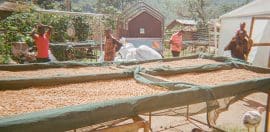Predictions for 2021: Co-ops and mutuals

2 February 2021 at 5:21 pm
Co-operative and mutual enterprises offer a way to build a more resilient, innovative and stable economy in the 21st Century, writes Melina Morrison, in the latest in our series of predictions about what the social economy can expect from 2021.
As the months of 2020 dragged on, each bringing a new challenge to overcome, the articles espousing the need for resilience – defining it, telling us how to be it, get it and to make it stick – proliferated. If years were assigned virtues, like Pantone colours, resilience would be 2020’s.
It was the year that made constant demands on our fortitude and pragmatism. 2020 tested our patience, our continued, collective ability to think and act flexibly, to apply our skills in new and imaginative ways and to innovate on the fly.
And while we arrive in 2021 better equipped to deal with a world and a workplace profoundly changed, we must press on with fierce intent if we are to see economic recovery and the instigation of social change.
Having witnessed the remarkable fragility of some of our most essential supply chains during the height of the pandemic, we cannot now erase that knowledge however ebullient the current mood. Our vulnerabilities, once exposed, will remain part of our collective character and consciousness for generations to come.
What could this period of flux look like for our economy and where could it lead us?
For some years, I’ve had an idea of what resilience in business looks like and, bear with me here, co-operative and mutual enterprises (CMEs) are it. How exactly is a 200-year-old idea borne out of the Industrial Revolution going to create a more resilient, innovative and stable economy in the 21st Century? Trust me, I’ve heard every imaginable interpretation of what a co-op is and who they serve over the years but there are few economically and socially desirable outcomes that co-ops and mutuals will not help us achieve.
This pandemic has left countries across the globe tackling the same problems at the same time. We are witnessing, in real time, the power of robust, diverse intellectual thought as economists and analysts from all schools of thought turn their attention to the challenges wrought upon us by a global health crisis.
What analysis of the Australian economy is telling us is that we have a “missing middle”. Our economy will not be rescued by the ASX 200, where large scale job creation is not on the cards. At the other end of town, many once-thriving small businesses are struggling to survive, and others are not in a position to bear the brunt of taking risks.
Add to this the impact of an increasingly urgent transition to a low carbon economy seeing many traditional sectors shed jobs, giving way to new employment areas, often service-orientated, with casualised labour markets the norm.
We need business models that support workers to find fulfilling, high quality work in the gig economy. Co-ops and mutuals are ideally suited to handing back choice and control to employees as the owners of their labour hire platforms (platform cooperativism).
What we also need is more medium-sized businesses to bridge the gap: businesses in sectors where job creation is not only possible, but essential.
We need to harness the drive of locally or family-owned small business while competing with the multinationals that are shifting local supply chains in favour of off-shore suppliers, or moving their headquarters and corporate roles to the cities.
The co-op model allows small businesses to function as medium or large businesses, accessing all the advantages of scale, while remaining locally owned and continuing to support local supply chains. This opportunity to build the middle of the Australian economy is further enhanced by changes to the Corporations Act, meaning that co-ops and mutuals can now raise capital without risking demutualisation or taking on debt. The legislative changes were the result of a unified campaign led by the Business Council of Co-operatives and Mutuals (BCCM) and its members to create a more enabling business environment for co-ops and mutuals to compete and thrive.
The introduction of mutual capital instruments (MCIs) was a fundamental step forward for existing co-ops and mutuals and as it turns out, a timely one, as these businesses are now primed to take on a central role in our economic recovery.
CMEs are demonstrably more resilient than their shareholder-owned competitors, surviving on average 25 per cent longer, according to recent research commissioned by BCCM. The report, Leading the Resilience, demonstrates that CMEs act as anchors to the Australian economy, providing consistency and seeing us through crisis after crisis, emerging stronger than ever. By remaining focused on their purpose and their members, they have thrived.
Allowing businesses like these to access growth capital gives them the ability to compete on a level playing field. This can spark innovation, growth, job creation, increased sovereign capacity, and deeper and more diverse global trade relationships. The first MCI issuance has already demonstrated the appetite for investments that have genuine impact in the communities these businesses serve. What it also shows is how CMEs are seen through the eyes of investors – stable, credible investment opportunities over a long term.
The coming months will provide an opportunity for many industries and businesses to take the fallout of the year past and turn it into something meaningful, not least, the aged care sector, as we anticipate the final report from the Royal Commission into Aged Care Quality and Safety at the end of February. I anticipate there will be much to be learned from the experiences of CMEs both within and outside of the sector.
The royal commission’s interim report, tellingly entitled Neglect, exposed sub-standard levels of care with poor consumer outcomes causing distress and heartache for families and carers. The early findings can be distilled into four key areas of focus: culture, innovation, ownership and quality. The CME model offers a different way of approaching the way that aged care is delivered and governed. Action to Empower, a report by BCCM into the potential for co-operatives and mutuals to change the landscape in social care, demonstrates that this is a proven business model in which stakeholders are empowered through collective ownership.
Member-owned businesses that have the primary objective of creating, protecting and returning value to members can be solely focused on those outcomes. Further, democratic governance in the business results in shared accountability, those with real skin in the game, can make decisions and take accountability for the results. I would hope that the months ahead see this conversation progress and that the significant value of member-owned aged care is brought to light as a serious contender for a more compassionate, consumer-centric approach.
In the contribution of co-ops and mutuals to our sustained growth, their potential to enhance our capability in new sectors and their global outlook while maintaining local values we see a new way to build an Australian economy in the 21st Century: a way to build resilience, not as a buzzword of 2020, but as a foundation for whatever the next 200 years might have in store.
This article is part of a series of 2021 predictions from experts across the social sector.
See also:







